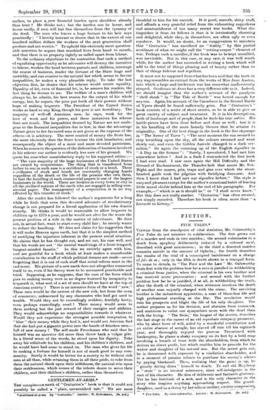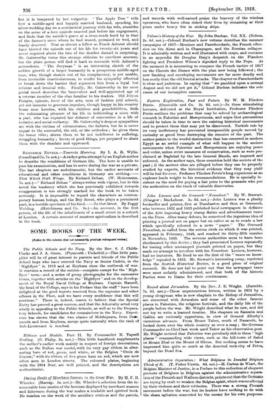FICTION.
FIVE TALES.•
VIEWED from the standpoint of vital statistics, Mr. Galsworthy's Fire Tales do not minister to exhilaration. The first grows out of a murder and ends in two suicides ; the second culminates in a death from apoplexy deliberately induced by a colossal meal, described with great minuteness ; in the third a deserted maiden commits suicide in the manner of Ophelia ; the fourth describes the results of the trial of a conscripted hairdresser on a charge of fel) de es ; only in the fifth is death shown in a tranquil form. To come to details, in " The First and the Last " Mr. Galsworthy deals first with the problem how far a men is justified in withholding a criminal from justice, when the criminal is his own brother and has received acute provocation ; and second with the further problem how far he is justified, if at all, in withholding the truth, after the death of the criminal, when reticence involves the death of another man unjustly charged with the crime. The surviving brother is the industrious apprentice, a man of blameless life and high professional standing at the Bar. The revelation would ruin his prospects and blight the life of his only daughter. The author prepares us for his decision, and abstains from comment, and contrives to enlist our sympathies mere with the dead than with the living. " The Stoic," the longest of the stories, describes the last stage in the career of an old reprobate company promoter, who by sheer force of will, aided by a wonderful constitution and an entire absence of scruple, has staved off ruin till his eightieth year, and thoroughly enjoyed the process. Threatened with bankruptcy, he places a shaky company on its feet by a bold coup involving a breach of trust with the shareholders, from which he derives no direct profit, but which enables him to provide for the widow and daughter of his natural son. But the secret gets out, he is threatened with exposure by a vindictive shareholder, and in a moment of passion refuses to purchase his enemy's silence by paying blackmail. Then, realizing that the gams is up, he " greatly daring dines " himself to death. To call old Iicythorp a " stoic " is an ironical misnomer, since self-indulgence is the root of his character. He dies of deliberate and fantastic gluttony. Yet he has fortitude of a sort, and is the only character in the story who inspires anything approaching respect. The grand- daughter, used as a detoy by her odium; mother, excites compassion, • Fins Tales. By Jolla Gabworthy. Lembo : W. minemsna. lbs. net.) but it is tempered by her vulgarity. " The Apple Tree " tells how a middle-aged and happily married husband, spending his silver-wedding day on a sentimental journey with his wife, stumbles on the scene of a love episode enacted just before his engagement, and finds that the suicide's grave at a cross-roads hard by is that of the farmer's niece whom he had wooed, promised to wed, and basely deserted. That so decent a fellow as Frank Ashurst should have blotted the episode out of his life for twenty-six years and never inquired about the fate of the derelict damsel is surprising. Mr. Galsworthy turns this strange oblivion to excellent account, but the plain person will find it hard to reconcile with Ashurst's antecedents. " The Juryman " is an interesting sketch of the sudden growth of a larger humanity in a prosperous middle-aged man, who, though shaken out of his complacency, is yet unable, from invincible inarticulateness, to render his sympathy effectual or break down the barrier that separates him from a loyal but reticent and ironical wife. Finally, Mr. Galsworthy in his most genial mood describes the benevolent and well-appointed age of a veteran member of the clan familiar to his readers. Old Jolyon Forsyte, epicure, lover of the arts, man of fashion (old school), yet not immune to generous impulses, though happy in his country home near London, with his children and grandchildren, finds the culminating pleasure of his life in befriending a niece with a past, who has expiated her defiance of convention in a life of isolation and social outlawry. Mr. Galsworthy's deepest sympathies are with the victims of circumstance, the failures, but he is never unjust to the successful, the old, or the orthodox ; he gives them the beaux roles ; shows them to be not indifferent to suffering, struggling humanity ; lovers of good things, yet prepared to share them with the desolate and oppressed.



























 Previous page
Previous page